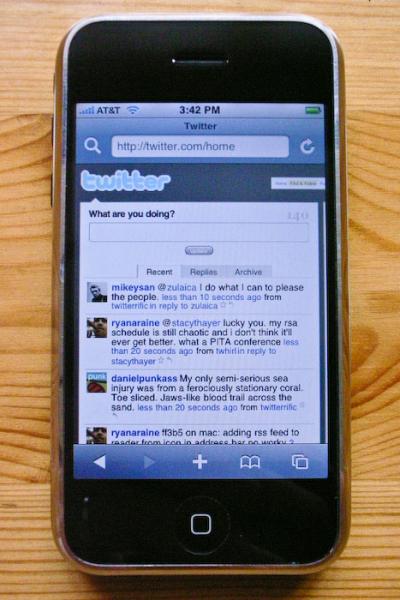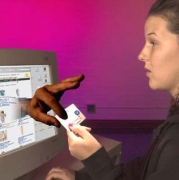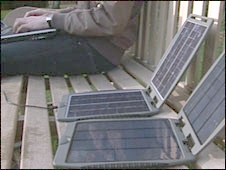 Technology
Technology

Text ban while driving may not curb car crashes
 (WSJ): Laws that forbid motorists from using hand-held phones or texting while driving don’t appear to result in a significant decrease in vehicle crashes, according to a new study by the US Highway Loss Data Institute. The study, comes amid stepped-up efforts by federal highway-safety regulators to ban texting while driving and curb other forms of driver distraction. Transportation Secretary Ray LaHood earlier this week announced rules to forbid commercial truck and bus drivers from text messaging while driving. LaHood has said he would ban all texting while driving if he could.
(WSJ): Laws that forbid motorists from using hand-held phones or texting while driving don’t appear to result in a significant decrease in vehicle crashes, according to a new study by the US Highway Loss Data Institute. The study, comes amid stepped-up efforts by federal highway-safety regulators to ban texting while driving and curb other forms of driver distraction. Transportation Secretary Ray LaHood earlier this week announced rules to forbid commercial truck and bus drivers from text messaging while driving. LaHood has said he would ban all texting while driving if he could.

MPs twitter with voters
 (BBC): More than 100 British Members of Parliament are using the social networking site Twitter to communicate with voters, a survey suggests. Tweetminster, which monitors politicians’ use of Twitter, said more now used it than wrote their own blogs. It found that, of 111 MPs tweeting, 65 were Labour, 23 were Liberal Democrats and 16 were Conservatives. Across the UK, London had the highest number of MPs on Twitter – 57 – followed by south-east England, on 40, and south-west England, on 37. Tweetminster found that Labour MPs had 91,061 Twitter followers, Lib Dems 22,754 and Conservatives 19,247.
(BBC): More than 100 British Members of Parliament are using the social networking site Twitter to communicate with voters, a survey suggests. Tweetminster, which monitors politicians’ use of Twitter, said more now used it than wrote their own blogs. It found that, of 111 MPs tweeting, 65 were Labour, 23 were Liberal Democrats and 16 were Conservatives. Across the UK, London had the highest number of MPs on Twitter – 57 – followed by south-east England, on 40, and south-west England, on 37. Tweetminster found that Labour MPs had 91,061 Twitter followers, Lib Dems 22,754 and Conservatives 19,247.

3D TV is being billed as possible industry saviour
 (BBC): 3D TV is being billed as a possible saviour for recession hit manufacturers looking to boost sales. On the opening day of the Consumer Electronics Show, CES, in Las Vegas, all the big names unveiled 3D TV’s. Industry experts said the picture looks promising with a survey showing around 3.4m 3D TV sets will be sold in the US this year. "It’s a challenging market. We need something to kick us out of this," said Panasonic’s Elsuke Tsuyuzaki. "To me, the thing that’s going to get us there is 3D," added the firm’s chief technology officer. "2009 is a year none of us want to repeat," said Gary Shapiro the president of the Consumer Electronics Association (CEA) which hosts the annual tech gathering.
(BBC): 3D TV is being billed as a possible saviour for recession hit manufacturers looking to boost sales. On the opening day of the Consumer Electronics Show, CES, in Las Vegas, all the big names unveiled 3D TV’s. Industry experts said the picture looks promising with a survey showing around 3.4m 3D TV sets will be sold in the US this year. "It’s a challenging market. We need something to kick us out of this," said Panasonic’s Elsuke Tsuyuzaki. "To me, the thing that’s going to get us there is 3D," added the firm’s chief technology officer. "2009 is a year none of us want to repeat," said Gary Shapiro the president of the Consumer Electronics Association (CEA) which hosts the annual tech gathering.
Website axes holiday weight gain members
(BBC): Dating and social network siteBeautifulPeople.com has axed some 5,000 members following complaints that they had gained weight. The members were singled out after posting pictures of themselves that reportedly showed they had put on pounds over the holiday period. The site allows entry to new members only if existing members vote them as sufficiently attractive to warrant it. The US, the UK, and Canada topped the list of excluded members. The site has always been unrepentant about its selection process, calling itself "the largest network of attractive people in the world".
Viruses that leave victims red in the Facebook
(New York Times): It used to be that computer viruses attacked only your hard drive. Now they attack your dignity. Malicious programs are rampaging through Web sites like Facebook and Twitter, spreading themselves by taking over people’s accounts and sending out messages to all of their friends and followers. The result is that people are inadvertently telling their co-workers and loved ones how to raise their I.Q.’s or make money instantly, or urging them to watch an awesome new video in which they star.
Facebook faces criticism on privacy change
(BBC): Digital rights groups and bloggers have heaped criticism on Facebook’s changed privacy policy. Critics said the changes were unwelcome and "nudged" people towards sharing updates with the wider web and made them findable via search engines. The changes were introduced on 9 December via a pop-up that asked users to update privacy settings. Facebook said the changes help members manage updates they wanted to share, not trick them into revealing too much. "Facebook is nudging the settings toward the ‘disclose everything’ position," said Marc Rotenberg, executive director of the US Electronic Privacy Information Center (Epic).

Cops to host on-line scam prevention meeting
 (CNS): The Royal Cayman Islands Police Service is urging people to be extra vigilant when it comes to internet shopping during the Christmas season to ensure that they don’t become victims of internet fraud. Officers from the Financial Crimes Unit will be attending a public meeting tonight, Tuesday 8 December in West Bay to advise people how to avoid being scammed. “Every year more and more people rely on the internet for their Christmas shopping and we just want to make sure that we are doing everything we can to let people know what to watch out for,” said Sergeant Michael Montague who will be attending the session.
(CNS): The Royal Cayman Islands Police Service is urging people to be extra vigilant when it comes to internet shopping during the Christmas season to ensure that they don’t become victims of internet fraud. Officers from the Financial Crimes Unit will be attending a public meeting tonight, Tuesday 8 December in West Bay to advise people how to avoid being scammed. “Every year more and more people rely on the internet for their Christmas shopping and we just want to make sure that we are doing everything we can to let people know what to watch out for,” said Sergeant Michael Montague who will be attending the session.
“Internet crooks have no conscience – it will not matter to them that you are spending your last buck buying presents for your kids – if they can scam you they will scam you,” he added.
Police warned internet users when shopping on-line to be aware of potential credit card fraud and advised them to ensure sites are secure and reputable before providing card details and not to provide any financial information when asked to do so through unsolicited e-mails.
Montague said that the reoccurring online scams include exaggerated claims of possible earnings or profits, messages and calls saying you’ve won a lottery demands to send money to be eligible for future winnings. Long standing scams also include people representing themselves as foreign government officials asking to place large amounts of money in your bank account as well as phishing or spoofing where unsolicited e-mails request personal information.
“Remember that if something appears too good to be true – then it is too good to be true,” added Sgt Montague.
Anyone who wants further information about how to avoid becoming a victim of internet fraud can either attend the meeting in West Bay tonight in John A Cumber Primary School at 6.30p.m. or contact the RCIPS Financial crime Unit on 949-8797.
Anyone with information about crime taking place in the Cayman Islands should contact their local police station or Crime Stoppers on 800-8477 (TIPS).

How to shop safely online this Christmas
 (The Telegraph): The Christmas shopping season is in full swing, but it’s not just the likes of Amazon rubbing their hands with glee; Christmas is a gift for hackers and fraudsters. Buying your Christmas gifts online is undoubtedly more convenient than joining the huge crowds at your local shopping centre. It also gives consumers an opportunity to make really informed purchases, and get what they’re looking for at the best price. By following a few simple golden rules, it is possible to shop safely online and still bag a bargain, all the while ensuring that the season of goodwill doesn’t extend to cybercriminals and fraudsters.
(The Telegraph): The Christmas shopping season is in full swing, but it’s not just the likes of Amazon rubbing their hands with glee; Christmas is a gift for hackers and fraudsters. Buying your Christmas gifts online is undoubtedly more convenient than joining the huge crowds at your local shopping centre. It also gives consumers an opportunity to make really informed purchases, and get what they’re looking for at the best price. By following a few simple golden rules, it is possible to shop safely online and still bag a bargain, all the while ensuring that the season of goodwill doesn’t extend to cybercriminals and fraudsters.

Solar power technology takes its next step
 (BBC): The technology behind solar energy is constantly evolving. Portable devices that charge up gadgets from the sun are becoming smaller and more powerful. A new generation of portable solar chargers can plug straight into a laptop and provide up to a quarter of its power needs while in use. The Solargorilla charger by Powertraveller, for instance, can also level out the electrical spikes caused when clouds obscure the sun.
(BBC): The technology behind solar energy is constantly evolving. Portable devices that charge up gadgets from the sun are becoming smaller and more powerful. A new generation of portable solar chargers can plug straight into a laptop and provide up to a quarter of its power needs while in use. The Solargorilla charger by Powertraveller, for instance, can also level out the electrical spikes caused when clouds obscure the sun.

Two arrested for trojan virus that steals bank details
 (BBC): Two suspected computer hackers have been arrested in Manchester in a major inquiry into a global internet scam designed to steal personal details. The trojan program is believed to have infected thousands of computers around the world, said the Metropolitan Police, which is leading the inquiry. A man and woman, both aged 20, have been questioned and bailed until March 2010 pending further inquiries. Police revealed the arrests were the first in Europe as part of the inquiry. The investigation focused on the ZeuS or Zbot trojan – "a sophisticated malicious computer program", said police.
(BBC): Two suspected computer hackers have been arrested in Manchester in a major inquiry into a global internet scam designed to steal personal details. The trojan program is believed to have infected thousands of computers around the world, said the Metropolitan Police, which is leading the inquiry. A man and woman, both aged 20, have been questioned and bailed until March 2010 pending further inquiries. Police revealed the arrests were the first in Europe as part of the inquiry. The investigation focused on the ZeuS or Zbot trojan – "a sophisticated malicious computer program", said police.